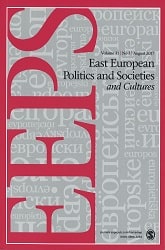Shifting References: Celebrations of Uprisings in Croatia, 1945-1991
Shifting References: Celebrations of Uprisings in Croatia, 1945-1991
Author(s): Drago RoksandićSubject(s): Political history, Government/Political systems, WW II and following years (1940 - 1949), Post-War period (1950 - 1989), History of Communism, Fascism, Nazism and WW II, Politics of History/Memory
Published by: SAGE Publications Ltd
Keywords: Yugoslavia; politics and history; political history; 1945-1991; Josip Broz Tito; Communist Party of Yugoslavia; celebrations of uprisings; national liberation struggle; partisan movement; WW II;
Summary/Abstract: Yugoslav political ideology had a continuously ambivalent approach to history during the period after 1945. At one extreme was the interpretation of party ideologists who viewed their party (and especially events after Josip Broz Tito became its leader in 1937) in the context of the "centuries-old" desire of the South Slavs to live in a common country. This ideopolitical interpretation had its basic precondition in the "national liberation war" and the Communist Party of Yugoslavia's (CPY) leadership in the struggle against Nazi-fascist occupation from 1941 to 1945. This approach accentuated the continuity of the historical process and the Communists both as the "final" interpreters of the "laws of history" and as those who achieved their "historical role." At the other extreme was the interpretation that considered the victory of the "National Liberation Army of Yugoslavia" in the war with the Nazi-fascist occupiers and "domestic traitors" (Ustashe, Chetniks, Ballists, and so forth) as the end of the prehistory of the Yugoslav people and the beginning of their true history in the Communist paradigm. [...]
Journal: East European Politics and Societies
- Issue Year: 09/1995
- Issue No: 02
- Page Range: 256-271
- Page Count: 16
- Language: English
- Content File-PDF

